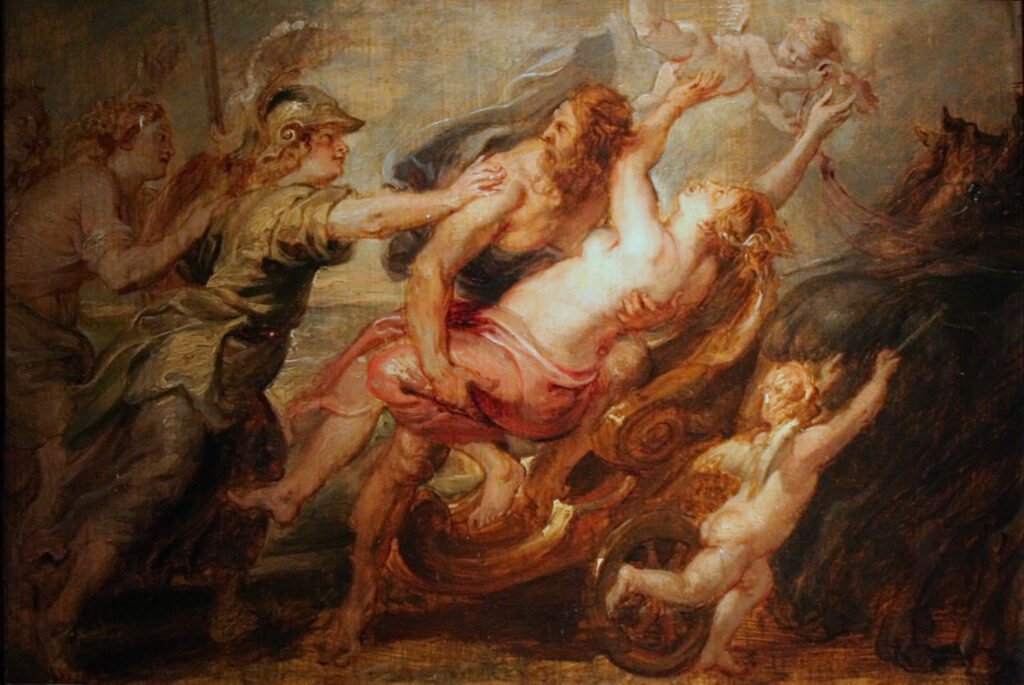Demeter, known in Greek mythology as the goddess of agriculture and grain, is a powerful and complex deity with a rich tapestry of divine and mortal lovers. These passionate relationships not only reveal the depths of her desires and vulnerabilities but also shed light on the various myths and stories associated with her. In this comprehensive exploration, we will dive into the fascinating world of Demeter’s lovers, both divine and mortal, and unravel their significance in Greek mythology.
Divine Lovers
Poseidon: The Pursuit and Rape of Demeter
One of Demeter’s most well-known and tragic divine lovers is Poseidon, the god of the sea. The story begins with Demeter’s mourning over the loss of her beloved daughter, Persephone, who was abducted by Hades and taken to the Underworld. In her grief, Demeter takes the form of a horse to hide among a herd of horses, seeking solace in the companionship of these magnificent creatures.
However, Poseidon, known for his insatiable desires, discovers Demeter’s hiding place. He transforms himself into a powerful and alluring stallion and descends upon her with force, raping her against her will. This violent union between Demeter and Poseidon resulted in the birth of two offspring, Areion and Despoine.
Zeus: A Divine Union of Serpents
Another significant divine lover in Demeter’s life is Zeus, the king of the gods. In one version of their union, Demeter and Zeus come together in the form of intertwining serpents. This unique and sacred act of love gives birth to their daughter, Persephone, who would later become a central figure in the story of Demeter.
Mortal Lovers
Iasion: Tragic Love in a Thrice-Ploughed Field
A mortal lover who captured Demeter’s heart was Iasion, a prince of Samothrace or Crete. Their passionate affair reached its pinnacle when they found solace in each other’s embrace in a thrice-ploughed field. However, their love would meet a tragic end, as Zeus, consumed by jealousy, struck down Iasion with a thunderbolt.
Despite the abrupt conclusion of their love affair, Demeter and Iasion’s union brought forth two twin sons, Ploutos, the god of wealth, and Philomelos, who became the patron of agricultural laborers.
Karmanor: Love on the Island of Crete
Demeter’s divine desires extend to the mortal realm once again, with her infatuation for Karmanor, the lord of Tarrha, an island in Crete. Their passionate relationship resulted in the birth of a son, Eubouleos, who is associated with the ploughed earth, emphasizing Demeter’s agricultural domain. They also had a daughter named Khrysothemis, who is considered the demi-goddess of the harvest festival.
Divine Offspring
Areion: The Immortal Horse
Areion, the offspring of Demeter and Poseidon, is an immortal horse known for its incredible speed and strength. Owned successively by Herakles and later Adrastos, Areion played significant roles in various myths and legends.
For Herakles, Areion was a loyal companion throughout many of his trials and adventures. The horse’s remarkable abilities often helped Herakles overcome formidable challenges, showcasing the divine heritage bestowed upon Areion by his parents.
In the context of the Trojan War, Adrastos, the king of Argos, rode Areion into battle. Their presence instilled fear in the hearts of the enemy, and they are remembered for their valor and contribution to the Greek cause.
Despoine: The Goddess of Arkadian Mysteries
Despoine, the daughter of Demeter and Poseidon, holds a significant role as the goddess associated with certain Arkadian Mysteries. These mysterious rituals were performed in her honor and were considered crucial to ensuring a bountiful harvest and the well-being of the community. Despoine’s presence and influence in these rituals speak to her divine heritage and Demeter’s connection to the agricultural cycle.
Eubouleus: The Demi-god of the Ploughed Earth
Eubouleus, the son of Demeter and Karmanor, is revered as the demi-god associated with the ploughed earth. His presence symbolizes the importance of agriculture and the labor that goes into cultivating the fertile land. The juxtaposition of his mortal and divine parentage further enhances the significance of his role in the agricultural domain.
Chrysothemis: The Demi-goddess of the Harvest Festival
Chrysothemis, the daughter of Demeter and Karmanor, holds the title of the demi-goddess associated with the harvest festival. Her association with this festival underscores Demeter’s role as the goddess of agriculture and further solidifies the connection between the divine and mortal worlds.
Conclusion
In conclusion, Demeter’s diverse and passionate love affairs, both with divine and mortal beings, provide insight into her multifaceted character and role in Greek mythology. Her relationships with Poseidon, Zeus, Iasion, Karmanor, and their resulting offspring shed light on her desires, vulnerabilities, and the far-reaching consequences of her actions.
These stories not only delve into the complexities of Demeter’s personal life but also highlight the importance of agriculture, fertility, and the cycles of nature in Greek society. By understanding the significance of Demeter and her lovers, we gain a deeper appreciation for the cultural and religious importance placed on the earth’s abundance and the rhythms of life.
From the divine horse Areion to the goddesses Despoine and Chrysothemis, Demeter’s lovers and their offspring continue to enrich Greek mythology and inspire awe and reverence for the natural world.
